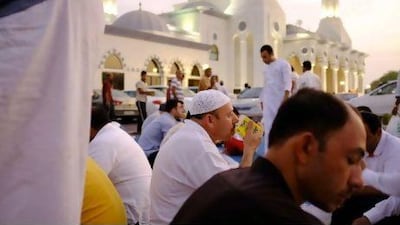DUBAI // An eye-catching blend of eastern and western styles at a mosque in Umm Suqeim symbolises the remarkable work being done there to bring different cultures together.
The four minarets of Al Farooq Umar ibn Al Khattab Mosque tower above the surrounding villas and the exterior resembles the Blue Mosque in Istanbul.
The familiar blue domes, illuminated by outside lights in the evenings, attract visitors as well as the faithful.
But it is what goes on inside the mosque and its neighbouring library that inspires those who work and worship there.
"The aim is to bring people together from different faiths and dispel some of the misconceptions they may have of Islam, and learn more about each other," says Abdel Malek Abdel Khalek, the manager of the Islamic centre at the Al Farooq Mosque.
"There are very few mosques that have a library or lecture halls as we do, and we plan to use them to bring about better understanding among different faiths."
A group of university students has toured the mosque this Ramadan, and there has been a talk on the basic elements of Islam.
Mr Khalek aims to have Christian, Sikh, Hindu and Jewish speakers talk about their views on Islam and their own faiths.
"But it's not just non-Muslims who will benefit from learning more," he says.
"Muslims who do not understand the relationship between Islam and Christianity and the importance of the prophet Jesus to both faiths, for example, will also learn."
Mr Khalek says some of the misconceptions about Islam include that it is fundamentalist, that it does not allow for women's rights, and that it is intolerant of other religions.
"But then you look at the UAE, which is obviously a Muslim country but has more than 100 different nationalities and many faiths living together," he says.
The library, which is a separate building inside the mosque compound, has about 3,000 books. The vast majority of them are in Arabic, although there is an English-language section.
Organisers plan to eventually have 5,000 books available as a reference source for Muslims and non-Muslims.
It has been a quiet Ramadan with occasional visitors to the library, says Shatha Ryalat, the librarian at the Islamic centre.
"Our Arabic language section is very extensive but we still have many more books to add," Ms Ryalat says.
The books are organised in neat rows related to Quranic studies, Hadiths and Islamic practice. Other books are on topics such as history, and the Arab and world civilisations.
"Although I understand Arabic, I prefer to read the Quran in English," says Ms Ryalat, a Jordanian who also teaches Islamic studies at the centre.
"The Arabic in the Quran is so rich that sometimes I find it easier to read the English translation."
There are plans to add books in other languages, including Urdu and Tagalog.
The centre will hold monthly lectures from religious experts of all backgrounds after Eid Al Fitr.
"Islam says knowledge before acting," Mr Khalek says. "In other words, we must learn before we make our move forward."
Haris Kulangarakandy Randu Purayil, an Indian engineering consultant, is among the worshippers at midday prayers in the mosque.
"It's a great design and when you pray inside, it's amazing," Mr Purayil says. "The atmosphere has been perfect in the evenings during Ramadan and I really hope the work that they do in the centre does well because it's important."
He believes the lectures and classes at the centre will foster better understanding for Muslims and non-Muslims.
Sulaiman Al Sayed Al Hashemi, an Emirati businessman, has made his first visit to the mosque.
"The architecture is truly amazing," Mr Al Hashemi says. "I love the way they have designed and built the domes. And inside … the windows flood the hall with light."

